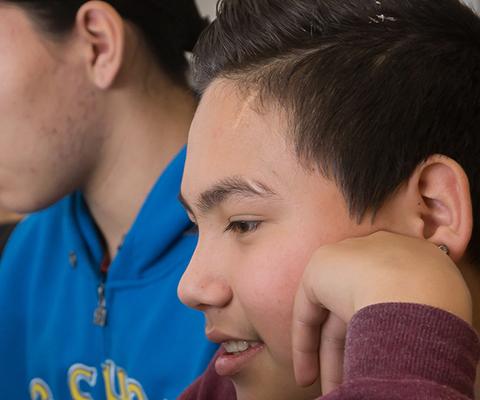
SNP STEAM Student Portal
SNP STEAM uses D2L as a student portal. Log in to view your courses, explore tools and features, and customize your eLearning experience.

Student Handbook
The STEAM Academy School Handbook and Course Calendar is your source for student information.
Technology is everywhere; we use it in our everyday lives – from work to school to socializing and more. To satisfy our desire and need for technology, we require skilled technology professionals to make it possible.
If you’re considering pursuing a career in technology or have an interest in learning more about technology, SNP STEAM Academy can help you reach your goals. You will be taught by qualified teachers, meet mentors from our private sector business partners, have hands-on experiences with the latest technology, and begin taking college courses as early as grade 10.
In five-six years you will graduate from SNP STEAM Academy with an Ontario Secondary School Diploma and a Software Engineering Technician college diploma. Upon graduation, you will be career-ready and may choose to enter the workplace, continue your post-secondary education, or become a technology entrepreneur after graduation.
SNP STEAM Academy accepts students in applied and academic programs, who are entering grade 9 in September. Limited space may be available for students entering grade 10.
Apply
The school is open to students of all backgrounds and abilities.
Transfer Student Process / Application Process
In order to apply to SNP STEAM Academy online please click the button below.
Paper copies can be provided, please see us on-site at 411 Elgin St. for a paper copy. After completing your online application we ask that you bring in a paper copy of your most recent report card and Individual Education Plan (IEP) if applicable. When you bring those in we will have you sign a consent to release information form which allows us to communicate with your child’s current school for the purposes of assessing their application and accepting their documentation in the event of a successful application.
Once the application review committee has reached a decision successful applicants will be notified and the student’s Ontario Student Record (OSR) will be requested from the student’s current school and they will be registered at SNP STEAM Academy.
What Do I Need to Graduate?
- 30 credits
- 18 compulsory credits earned in a specified number of courses from a list of subjects every student must take
- 12 optional credits earned in courses that are offered by the school
- 40 volunteer hours
- Meet provincial literacy requirements (EQAO testing)
For more information, visit the Ontario Ministry of Education website.
Extra-Curricular Activities
Robotics
Our inaugural year entering into robotics has had a strong start with our team alliance winning the STEMley cup. Students are welcome to participate in a variety of ways including the drive, design, manufacturing, or coding teams.
Music
The music club runs weekly for students to jam together and start learning the elements of music.
Dungeons & Dragons
For students interested in creating characters, role-playing, and going on fantastic adventures!
Track and Field
Coming soon
eSports
Coming soon
Lacrosse
Coming soon
Tennis
Coming soon
Golf
Coming soon
Badminton
Coming soon
Cross Country Running
Coming soon
Guidance
Guidance Counsellor and school counsellors are available to meet during Community Hour or other scheduled times about a variety of issues: mental health and wellbeing, hygiene, academic struggles, organizational difficulties, etc. If you need help, they’re here to talk to!
Grade 10, 11, and 12 secondary school students taking the college stream will also be taking Dual-credit courses where they earn secondary school credit and college credit at the same time.
Grade 13/Fifth Year students taking solely college-level courses to finish their college diploma will have a schedule that more closely resembles a college program with 4 month semesters.
Weekly
- Community Hour Clubs
- OLI Dance Program
- Friday Orange Shirt Days
Monthly
- Guest speakers and elders teaching the students about a variety of topics.
- Award ceremonies where students are awarded based on their efforts in demonstrating the Hodinohso:ni values: Fairness; Sharing; Honesty; Kindness; Confidentiality; Consistency; Integrity; Responsibility; Responsiveness; Cooperation; Openness; Trustworthiness
Yearly
- Land camps in the summer where students spend 15 days on the land and earn secondary school credit in the process.
Learning Resource Teacher
The Learning Resource Teacher provides support to teachers and students by implementing appropriate educational programming in an inclusive environment for learning. The LRT is to monitor student progress and improve student self-efficacy. Work with classroom teachers and EAs to recognize any students with academic delays. The LRT will also assemble IEPs to assist students with their academic success. Psychoeducational Assessments, such as the K-TEA and WJ-R are provided to students so that the school will have a better understanding of the student's strengths and weaknesses. The information gathered by a psychoeducational assessment will help to highlight the appropriate accommodations that will be helpful in the student's academic success. The EAs provide a vital role. They will work closely with students one-on-one or in small groups to provide indirect instructions and facilitate the students and their needs. Staff will also provide support to students after classes.
Mental Health
We do not endorse or recommend any particular products, treatments, services, or diagnosis, whether specifically or generally, and professional advice should be sought in relation to all health and treatment decisions. We provide information and listings only, which we hope are helpful, however, full disclaimers and warranties apply. See SNP Mental Health unit.
- Guidance Counsellor - Ms. Danielle VanEvery
- Social Counsellor - Ms. Brittany Johnson
Volunteer Information
Community Involvement Activities (High School Student Volunteering Hours)
As part of the requirement for an Ontario Secondary School Diploma, every student who begins high school after the 1999 – 2000 school year is required to complete a minimum of 20 hours (until Sept. 2022) of community involvement activities. Community involvement activities develop a student’s awareness and understanding of good community citizenship, social responsibilities, and the contributions they can make to society. Students may begin accumulating their 20 volunteer hours in the summer before starting grade 9 and must complete their volunteer hours while in high school.
Volunteer Opportunities
Student volunteer activities that are eligible for community involvement activities are businesses, not-for-profit organizations, public sector institutions (including hospitals), and informal settings.
Ineligible Activities
The Ontario Ministry of Education has developed a list of activities that are ineligible activities. Ineligible activities are activities that:
- Are a requirement of a class or course in which the student is enrolled (i.e. cooperative education portion of a course, job shadowing, work experience);
- Takes place during the time allotted for the instructional program on a school day. However, an activity that takes place during the student’s lunch break or spare periods is permissible;
- takes place in a logging or mining environment, if the student is under sixteen years of age;
- takes place in a factory, if the student is under fifteen years of age;
- takes place in a workplace other than a factory, if the student is under fourteen years of age and is not accompanied by an adult;
- would normally be performed for wages by a person in the workplace;
- involves the operation of a vehicle, power tools, or scaffolding;
- involves the administration of any type or form of medication or medical procedure to other persons;
- involves handling of substances classed as “designated substances” under the Occupational Health and Safety Act;
- requires the knowledge of a tradesperson whose trade is regulated by the provincial government;
- involves banking or the handling of securities, or the handling of jewelry, works of art, antiques, or other valuables;
- consists of duties normally performed in the home (i.e., daily chores) or personal recreational activities;
- Involves activities for a court-ordered program (e.g., a community-service program for young offenders, probationary program).
Community Hours Form
For more information, visit the Ontario Ministry of Education website.

